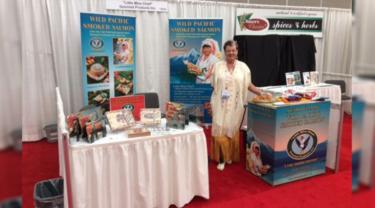Based in the Okanagan, Little Miss Chief Gourmet Products specializes in wild Pacific smoked salmon. Ellen Melcosky is the founder and president of the company.
Learn more about her export success here.
When and why did you first start thinking about exporting as part of your business?
Probably in 1996, because I felt I needed high volume sales to survive. My first export was to Spain in 1998, 2001 and 2002, followed by the Netherlands in 2006 and 2008, and then Poland. I’ve also had many small exports to the U.S.
What was your export journey like to get to where you are today?
Exporting is a never-ending challenge. You have to know the facts and rules and regulations for each country you export to, including labelling, packaging requirements, and health certificates. The Canadian Food Inspection Agency (CFIA) in Canada have stringent rules and regulations to follow, and a website that lists requirements for each individual country. But you cannot rely totally on this site because there could be new laws or regulations in the import country.
What is the biggest difference between selling in Canada and selling in another country? How did you adapt to that difference?
In Canada, the labelling and information on the package is French and English, and all rules regarding packaging is straight forward. If you export to the U.S., for example, the nutritional label is different. You just have to adjust to the rules and regulations of each country.
Has exporting abroad changed the way you market/sell your products/services in Canada?
No, not really. I stay consistent with priorities of quality over quantity. I stay with my Aboriginal theme and very proud to display the Product of B.C., Canada, and Ocean Wise labels. Our product is truly Canadian “Wild Pacific Salmon.” I do all of my marketing and have a personal contact with all the companies that I deal with. Most of my exports were the result of importers meeting me personally.
What have you learned from exporting that has benefitted your sales/operations in Canada?
Being consistent in the quality of product and service rendered is very important, and being able to supply in an expedient manner.
Can you share a “best lesson learned” from a challenging exporting experience?
Make sure your homework and paperwork are thorough. One order to an importing country was held in quarantine at customs because a number on the container was a typo error. Everyone worked at correcting this and I was so thankful that it was not my error.
When it comes to exports, what do you know now that you wish you knew when you started exporting?
Where to go to get all the information required.
What is the #1 thing new SMEs need to know about exporting and trade?
It just doesn’t happen overnight, it takes lots of work and research. Study rules and regulations for importing countries. Ensure you have all your certificates and paperwork in place. Work with the Trade Commissioner and agri-trade officers, as they are there to help make this happen. Make sure you are paid before your product leaves the country.
What is one characteristic that you believe every exporter should possess?
Be proud of your product. Stand behind your product. You are offering a quality item from Canada to many parts of the world.





